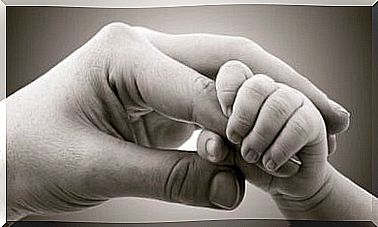Why Does Sadness Last Longer Than Other Emotions?

Why does sadness last longer than other emotions? We are sure that you have felt sad at various times in your life. But did your pain continue without knowing why? It makes you crawl into your shell and casts a shadow over everything else in your life for days or even weeks.
Antoine de Saint-Exupéry said: “sorrow is one of the vibrations that proves that we are alive.” Maybe he was right. It may be that few emotions are such obvious examples of what human existence so often is: dealing with disappointment, loss, grief, and the echo of things you’ll never see again.
What we know for sure is that you can’t run from sadness or hide it like an unwanted toy. Sadness lasts longer than emotions such as surprise, happiness, boredom, disgust or even anger. There is a reason why this is so and we will talk about it in this article.

Reasons why sadness lasts longer than other emotions
Grief has a bad reputation. We don’t know what to do with it and when we experience it we want to get rid of it as soon as possible. Not only that, but when someone sees you’re sad, you’re usually told something like, “Shut up! Do not be sad. Life is too short!”
In our collective ideology, we associate sadness with weakness, so maybe that’s why we’re not good at dealing with it. Paul Ekman, a psychologist who pioneered the field of emotions, says we would have better mental health if we understood more about these psychophysiological states.
For starters, something Ekman explains in books like Knowing our Emotions (written in collaboration with Daniel Goleman) is that grief lasts longer than other emotions for a very concrete reason: it’s made up of many other emotions.
In other words, grief never comes alone. It’s like the cork on a bottle. When you pull it out, you discover anger, annoyance, and even fear.
By dissecting sadness, finding out what it consists of, you can understand it and move on. However, other factors also explain why this emotion is so persistent. However, other factors also explain why this emotion is so persistent.
Grief is proportional to the event that causes it and how you interpret it
You’ve had a partner for five years and you’ve invested everything in your partner. You tried your best to make everything work, but eventually you realize it’s healthier to end the relationship. After the breakup and spending so much time fighting for that love, you feel infinitely sad. That sadness lingers for months or even years.
Someone else experiencing this too may interpret it as a relief. This small example shows us something very simple. Sadness lasts longer than other emotions because the things that trigger it are more profound. They are often related to events that can be traumatic. Yet it all depends on how you interpret those experiences.
In addition to how you process the event, your coping skills play a role. Some people are more resilient when it comes to dealing with setbacks. Others withdraw into a state of helplessness that prolongs their grief.
The Danger of Pondering: When Thoughts Feed Your Grief
The Catholic University of Leuven (English link) conducted a study that aimed to gain a deeper understanding of human emotions. Researchers were keen to know how long psychophysiological realities such as happiness, fear, and shame last. One thing they discovered is that happiness is not one of those long-lasting emotions.
- Emotions such as fear, surprise, boredom and disgust were very short. Of all the emotions they analyzed, however, sadness seemed to be the most lasting.
- The researchers wanted to understand why that might be the case. Why does grief last for weeks or even months? The answer lies in your thinking patterns.
- The musing and spinning of a triggering thought in your head makes it difficult for sadness to go away.
Not being able to let go of what has caused you disappointment, loss, or suffering doesn’t just make grief last longer. It also strengthens it.
There is also something else going on here. Grief can sometimes appear without a concrete motive. In that case, your thoughts continue to fan the flames of your grief and amplify the suffering and negativity.

Why does sadness last longer than other emotions? Because of our opposition
One of the reasons grief lasts so long is because we try to resist or avoid it. Refusal to accept this emotion makes it very difficult to deal with.
An emotionally healthy approach is to validate each emotion and understand that, in abnormal situations, complicated emotions are normal.
If you understand them, accept them and know how to deal with them, you will bring balance to your life. Recognizing that your emotions are normal allows you to face adversity with strength and resilience.
Therefore, it may be time to rethink many of the things you’ve learned about grief. Strength doesn’t mean putting up with everything and pretending everything is okay. Being brave means falling and getting up again, crying to make yourself feel better again, and seeking refuge and wisdom in introspection.
Denying your emotions, pretending power and pretending that nothing hurts you only deepens your wounds and makes your grief last longer.
As Antonio Damasio pointed out, humans are not rational beings who get emotional, we are emotional beings who know how to reason. Having a good understanding of your own emotions can help you live a more fulfilling and healthier life.









